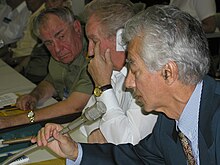| Sergo Mikoyan | |
|---|---|
 Sergo Mikoyan (speaking on the microphone) at the 40th Anniversary Conference of the Cuban Missile Crisis held in Havana in October 2002. Sergo Mikoyan (speaking on the microphone) at the 40th Anniversary Conference of the Cuban Missile Crisis held in Havana in October 2002. | |
| Born | (1929-06-05)June 5, 1929 Moscow, Soviet Union |
| Died | March 7, 2010(2010-03-07) (aged 80) Moscow, Russian Federation |
| Alma mater | Moscow State Institute of International Relations |
| Known for | Editor for Latinskaya Amerika |
| Awards | Order of Merit for Distinguished Service Commander (Peru) |
| Scientific career | |
| Fields | Latin American Studies Southeast Asian studies |
| Institutions | Institute for World Economic and International |
Sergo Anastasi Mikoyan (Armenian: Սերգո Անաստասի Միկոյան; Russian: Сергo Анаста́сович Микоян; June 5, 1929 – March 7, 2010) was a Russian historian. He was a leading specialist in the foreign policies of the Soviet Union and the United States in Latin America. He was the son of Anastas Mikoyan, an Old Bolshevik and high level Soviet statesman who served as a close advisor to Soviet premier Nikita Khrushchev.
Biography
Early life and education
Mikoyan was born to Ashkhen and Anastas Mikoyan in Moscow on June 5, 1929. He joined the Communist Party in 1953. In 1952, he graduated from the Moscow State Institute of International Relations. Mikoyan continued to live in Moscow until 1955. During the height of the Cuban Missile Crisis in October 1962, Mikoyan accompanied his father Anastas Mikoyan, as his executive secretary, to Cuba in high level negotiations with Fidel Castro and documented much of his father's private reminisces about the crisis. From 1970 onwards, he was the chief editor of the leading Soviet journal on Latin American affairs, Latinskaya Amerika, a Russian-language monthly. During perestroika, Mikoyan was also a prominent supporter of the Karabakh movement.
Scholarly life
Beginning in the late 1980s, Mikoyan was a participant in several joint Soviet/Russian-American international conferences on the crisis including the Harvard University sponsored conference at Cambridge, Massachusetts in October 1987, the Moscow conference in 1989, the Antigua conference in 1991 and the Havana conference in January 1992. He also participated at the 40th Anniversary Conference of the crisis held from October 10 through October 12, 2002. Mikoyan later became a chief researcher at the Institute of Peace at the Russian Academy of Sciences and held a professorship at Georgetown University.
Ever since the collapse of the Soviet Union in December 1991, Mikoyan's research and the possession of his father's unpublished memoirs have proved as important sources to American historians who specialize on the recent issues, namely the Cuban Missile Crisis, that have dominated the foreign affairs of the United States and the Soviet Union towards the countries of Latin America since the mid-1950s. While the focus of his studies also included Asia, Mikoyan's work was largely concentrated on the leftist revolutionary movements in the region, most notably Cuba, and its leaders such as Fidel Castro and Che Guevara.
Among the American historians and journalists Mikoyan has collaborated with are William Taubman, Jon Lee Anderson, Georgie Anne Geyer and Irving Louis Horowitz.
Mikoyan died of leukemia in a Moscow clinic on March 7, 2010.
Selected works
- (in Russian) США: Государство Пoлитикa, Bыбopы . Moscow, 1969.
- (in Russian) Kyбa строит социализм . Moscow, 1976.
- (in Russian) "The Caribbean Crisis in Retrospect" in Latinskaya Amerika. no. 1 (January 1988), pp. 40–80.
- Mikoyan, Anastas and Mikoyan, Sergo (ed.) The Memoirs of Anastas Mikoyan: The Path of Struggle, Vol 1. Translated from Russian. Sphinx Press, 1988 ISBN 0-943071-04-6
- Stalinism as I saw it. Occasional Paper. Washington: Kennan Institute for Advanced Russian Studies, 1991.
- "The Future of the Soviet-Cuban Relationship" in The Russians Aren't Coming: New Soviet Policy in Latin America, ed. Wayne S. Smith. Boulder, Colorado: Lynne Rienner Publishers, 1992.
- The Soviet Cuban Missile Crisis: Castro, Mikoyan, Kennedy, Khrushchev, and the Missiles of November, ed. Svetlana Savranskaya, Cold War International History Project. Stanford: Stanford University Press, 2012.
Notes
- ^ (in Armenian) Anon. «Միկոյան, Սերգո Անաստասի» (Mikoyan, Sergo Anastasi). Armenian Soviet Encyclopedia. vol. vii. Yerevan: Armenian Academy of Sciences, 1981, p. 542.
- ^ Blight, James G.; David A. Welch; Bruce J. Allyn. Cuba on the Brink: Castro, the Missile Crisis, and the Soviet Collapse. Oxford: Rowman & Littlefield, 2002 p. xxx ISBN 0-7425-2269-5
- Horowitz, Irving L. Cuban Communism. New Brunswick: Transaction Publishers, 1995 p. 109 ISBN 0-88738-794-2
- Malkasian, Mark (1996). Gha-ra-bagh!: The Emergence of the National Democratic Movement in Armenia. Detroit: Wayne State University Press. pp. 28–29. ISBN 0-8143-2605-6.
- Garthoff, Raymond L. A Journey Through the Cold War: A Memoir of Containment and Coexistence. Washington D.C.: Brookings Institution Press, 2001 pp. 184-185 ISBN 0-8157-0102-0
- The Cuban Missile Crisis, 1962: A Political Perspective After Forty Years. George Washington University.
- ^ "Well-Known Russian Historian Sergo Mikoyan Dies." RFE/RL. March 8, 2010. Retrieved March 11, 2010.